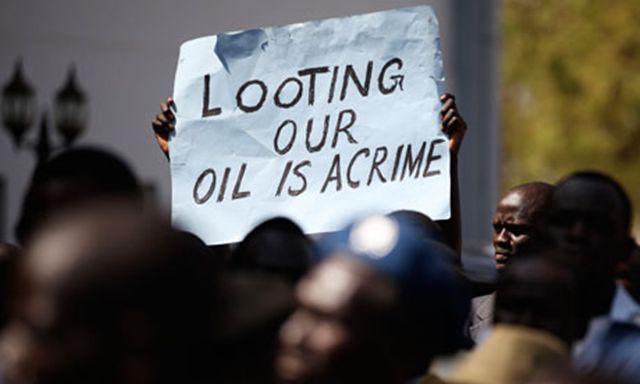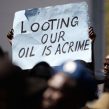
Playing with Fire: Oil Conflict Threatens Leadership of the Two Sudans
Publication: Terrorism Monitor Volume: 10 Issue: 6
By:

The leadership in Juba and Khartoum need to find a breakthrough in their oil dispute or they risk their own survival and the possible outbreak of an unprecedented level of conflict – even for Sudan. In late January the Republic of South Sudan, the world’s newest nation, cut off its oil supply to the world market. South Sudan seceded in July, 2011 after decades of brutal civil war. For both Juba and Khartoum, oil provides the vast majority of government revenues. The problem is that 80% of the oil lies under South Sudanese soil but is pumped out via pipeline to Port Sudan in the north. In recent months, South Sudan has accused Sudan of stealing large quantities of oil in transit to the Red Sea, while Khartoum claims that this is compensation for transit fees not paid. Oil revenue was a key issue in the 2005 Comprehensive Peace Agreement (CPA) that ended the Second Sudanese Civil War and paved the way for southern independence. However, no agreement was forthcoming and as a result, Khartoum sought $36 a barrel in transit fees – over ten times the standard rate and far more than the $1 per barrel the SPLM was prepared to pay (Sudan Tribune, February 7). When Juba refused to meet the fees, Khartoum began siphoning oil as payment, leading South Sudan to turn off the pumps.
Combined with mutual accusations of support for rebel movements and regular border skirmishes, this dangerous standoff, has sparked speculation of a return to full-scale conflict (Sudan Daily Vision [Khartoum], March 14). Everyone is right to be nervous – even Sudan president Omar al-Bashir has said that the two nations are closer to war than peace (AFP, February 3). The mostly Arab Muslim north and African Christian/animist south have been in conflict since before independence from Britain in 1956. Indeed Sudan was born into civil war. The perpetual animosity between the two, built ever stronger on conflict-related deaths in the millions, has created a zero-sum mindset for the ruling elites in both capitals when it comes to north-south relations. This needs to change, and it needs to change fast. Both ruling parties, the Sudan People’s Liberation Movement (SPLM) in Juba and the National Congress Party (NCP) in Khartoum increasingly risk their own survival the longer this stalemate continues, for if challengers from within feel they can solve these problems and attempt to take power by force, the whole region will shatter into violence resembling that of past decades.
Although Khartoum itself has seen development due to oil revenue, the rest of the country has been largely neglected by the ruling party. Corruption, tribal nepotism, economic stagnation, and a repressive security apparatus have bred growing resentment within Sudan to Bashir’s leadership. There were numerous stories of divisions within the NCP prior to the recent oil stalemate. Since then, the pressure has ramped up even further due to rising inflation and a Sudanese pound in steep decline (Sudan Tribune, February 24). Food and fuel shortages are increasingly common, and the government coffers are further depleted by Khartoum’s multiple counter-insurgencies. Bashir and his ruling clique may soon face difficulties in paying Sudan’s civil servants and security forces. [1] Together with increasingly disaffected youth and the external pressure of the Arab uprisings, the NCP now finds itself in a precarious position. While the hard-liners in his own party blame Bashir for losing the south (and thus the oil revenues) by signing the CPA, the military have reportedly warned Bashir that they are stretched thin and that a rush to war with Juba would be ill-advised (Sudan Tribune, January 30). If the NCP does not make an oil deal quickly, the cracks in Khartoum could widen, and by extension fuel the low-level insurgencies in Darfur, the Nuba Mountains, Blue Nile State, and Eastern Sudan, emboldened by an under-funded military and political turmoil in the capital.
While Juba sees Khartoum’s position as weakening, South Sudan has its own internal problems, and the stakes are perhaps even higher. Although the SPLM, led by Salva Kiir, are right to balk at paying ten times the market rate for oil transfers, negotiations should have continued. For Juba, whose focus should be building the groundwork for basic services and economic growth, cutting off the vast majority of its revenue is patently absurd. It would seem some in the SPLM do not realize the fragile position they are in since the signing of the CPA in 2005. The politico-military situation in South Sudan may in the future be increasingly viewed along ethnic lines. [2] In 1991, the SPLA split roughly between South Sudan’s two largest tribes, the Dinka and the Nuer (though many Nuer fighters remained under SPLA command). The late leader of the SPLA, John Garang, a Dinka, was widely perceived by his Nuer comrades to be engaging in favoritism to his people. “The Split,” as it is known in South Sudan, resulted in horrific levels of inter-communal violence. Over the ensuing decade, the conflict in the south escalated with several Nuer sub-groups forming their own militias, often funded and encouraged by Khartoum, to fight for control of the oil fields in Unity and Upper Nile states. Upon the signing of the CPA most South Sudanese militias were incorporated into a massive new military of over 200,000 troops (Reuters, June 21, 2011). Nevertheless, various armed insurgencies are ongoing in South Sudan. The SPLM has bought off some rebels while attempting to defeat others by force. Even if some of these “rebellions” are inspired by mercenary warlordism, the narrative among some Nuer and various other ethnic groups in South Sudan is that the country is becoming a Dinka-dominated, one party state.
Whereas there is a long history of political upheaval in Khartoum that some citizens see as inevitable, South Sudan’s experience with statecraft is still in uncharted waters. The sudden shrinkage of the national budget by over 90% is justifiably raising questions about the country’s leadership. The SPLM has announced deals to build new pipelines to Kenya and Eritrea, but these projects will cost billions of dollars and are years away (Reuters, February 22; BBC, February 9). In the meantime, as food and fuel shortages reach crisis levels, inflation skyrockets and signs of capital flight begin, the SPLM does not seem to have contemplated the nightmare scenario: a coup d’état. The SPLM and its military upper echelon is made up of elites who not long ago were commanding various rival subgroups of the Southern rebellion and continue to have constituencies in their home regions willing to take up arms on their behalf. In this case the fledgling South Sudan government may prove to be a house of cards as new militant groups emerge seeking control of the state – and by extension oil revenues. It is a certainty that Khartoum would fan the flames of such chaos with weapons and other material support to those forces it sees as operating in its interests.
If the current standoff results in internal political turmoil, we could see the two Sudans facing power vacuums that would surely produce intense levels of political and inter-communal violence on both sides of the border – but particularly in the South as the thin veneer of loyalty to the regime dissolves among elements of the SPLM and the military. African Union-sponsored talks between the two Sudan’s in Addis Ababa led to an accord on multiple issues, but the oil issue evaded solution, with woefully inadequate concessions offered by both sides (Sudan Tribune; March 15). Khartoum is already threatening to abandon even this limited agreement if Juba does not immediately cease its alleged support of rebel movements in the north. President Bashir, who is wanted by the International Criminal Court, will make his first visit to South Sudan since independence in July for further talks on the oil problem, prompting a public debate in Juba (Sudan Tribune, March 18). Behind closed doors, negotiations will surely be acrimonious and rife with suspicion. The leadership in Khartoum and Juba have long looked at each other with a burning hatred, but if they insist on continuing this brinksmanship they would be well advised to prepare for sudden and intense opposition from within their respective regimes.
Steven Costello is a freelance writer and analyst who has worked in emergency response in Malakal, South Sudan.
Notes:
1. Natsios, Andrew, “Sudan’s Oil Crisis is only Bashir’s First Problem,” Foreign Affairs, February 2012 https://www.foreignaffairs.com/articles/137065/andrew-s-natsios/sudans-oil-crisis-is-only-bashirs-first-problem?page=show.
2. Steven Costello, “A Second Split for South Sudan,” July 7, 2011, https://www.carnegiecouncil.org/resources/articles_papers_reports/0093.html.





